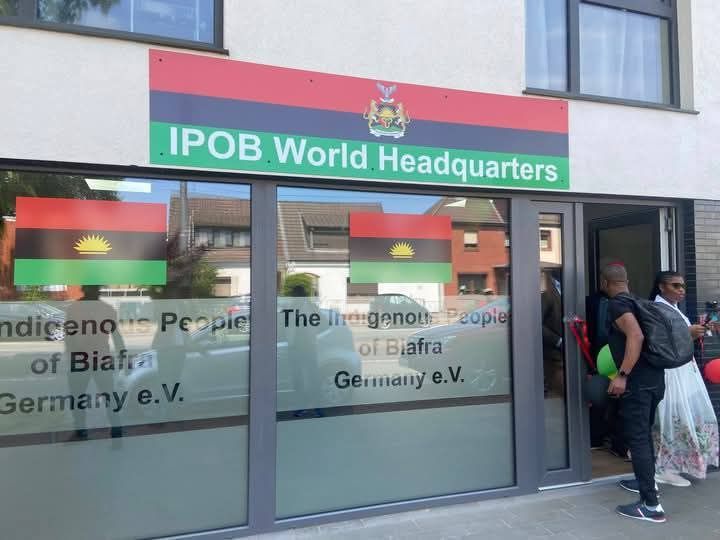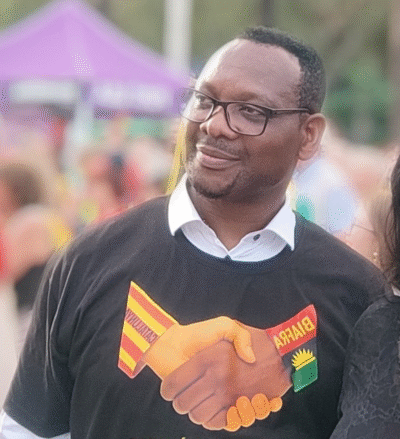
“Dignity We Deserve”: IPOB’s Catalonia Address Warns Inhouse Snitches And The Nigerian State Over Injustice and Violence
On the morning of Catalonia’s La Diada, a day synonymous with self-determination, the newly established IPOB liaison office in Barcelona pulsed with the weight of history and warning to “snitches” that collaborating with Nigerian authorities only endangers their own lives.
Barcelona, Spain — September 14, 2025
Before a sea of red, black, and green flags, Mazi Tony Nzurumike, the deputy head of the Directorate of States of the Indigenous People of Biafra (IPOB), delivered a speech that blended personal conviction, historical indictment, and a defiant call for dignity. Hours later, IPOB members would march through the Catalan capital to join the independence-day crowds, but first they listened as Nzurumike painted a sweeping portrait of Nigeria’s failures and Biafra’s unyielding quest for freedom.
“Some have argued that maybe why don’t we join politics and that maybe somehow we are going to have our freedom served on a platter of gold,” Nzurumike said, his voice rising above the low hum of cameras. “And we all know that is not true, that is not true, we will end up bamboozling ourselves, and we don’t want to do that. Look at them, those of them who said they are hardcore politicians. We know they are hardcore criminals; they are not politicians.”
His words cut through the room like a blade. For Nzurumike, electoral politics in Nigeria is not a pathway to emancipation but a trap—a machine, he suggested, built to recycle thieves while the people starve.
 Nzurumike accused the Nigerian Police Force of abandoning its constitutional duty, describing officers who “resort to being accomplice to the governors who loot money by being their escort.” He added, “…but their governors is stealing trillions and trillions of Naira but they give them police escort, they give them police escort, they protect them. And, the same police is hungry, he cannot feed his family.”
Nzurumike accused the Nigerian Police Force of abandoning its constitutional duty, describing officers who “resort to being accomplice to the governors who loot money by being their escort.” He added, “…but their governors is stealing trillions and trillions of Naira but they give them police escort, they give them police escort, they protect them. And, the same police is hungry, he cannot feed his family.”
The accusation reached beyond law enforcement to the country’s economic core. He cited the “fraud in NNPC, the scraping of the fuel subsidy, the stealing of the money,” all while Biafran communities—whose oil sustains the Nigerian economy—endure suffering that is both deliberate and unrelenting.
In a chilling passage, Nzurumike described systemic abductions of young people by “uniformed security officers” and called on Nigeria—“the zoo,” in his words—to stop the killings:
“Boys and girls are going about their business; you can’t provide for them, you won’t, but what you do is send down the killers in uniform to pick them up and kill them, and destroy their lives and property. Meanwhile, you claim to be the one responsible for protecting lives and property—that is not happening.”
The silence that followed this statement was heavy. In Catalonia—a region with its own long history of contesting state power—the parallel was not lost on the audience.
Mazi Tony Nzurumike recounted the founding instructions of IPOB’s Eastern Security Network (ESN), making clear it was conceived as a defensive force:
“He [Mazi Nnamdi Kanu] instructed them, don’t kill anybody, don’t kill any indigene. You are there to make sure criminals don’t invade our villages, our forests, our farmland, so that our women can go and cultivate in peace and come back home safely. That is what it was all about.”
He stressed that IPOB’s methods remain rooted in international norms:
“In peaceful manner, in the fashion the international community accept and welcome, and that’s what we’ve been doing all the while without any problem with any authority whatsoever in any part of the world.”
For Nzurumike and the movement he represents, the struggle is non-negotiable:
“The leadership of the Indigenous People of Biafra has maintained that this struggle must not be abandoned, it must not be abandoned because there is no alternative to struggling for the future generation.”
And at the heart of that struggle lies a demand as old as human society:
“If others can claim that human dignity is also for them, is sacrosanct, for us it is also sacrosanct. Dignity we deserve, freedom we deserve, and peace is also what we deserve. And we believe it’s non-negotiable.”
Nzurumike called on Biafrans to remain patient and steadfast, reminding them that the struggle honors those already lost to state violence and must continue until Biafra is free. He further urged members to reject internal betrayal and remain united.
He closed by thanking attendees for their dedication and reaffirmed IPOB’s peaceful, internationally focused strategy: “What we are doing is not illegal in the eyes of the world…civilized societies are seeing our effort as genuine.”
As the IPOB contingent later joined the La Diada procession through Barcelona’s streets, their banners carried both Biafran and Catalan symbols, underscoring a shared narrative of peoples seeking self-determination. Nzurumike’s speech—equal parts indictment and invocation—resonated not only with his compatriots but with Catalans familiar with the costs of asserting national identity.
Far from a routine address, the Catalonia gathering was a strategic and symbolic moment: a reminder that the Biafran struggle, as articulated by Nzurumike, is tethered to universal ideals of dignity, justice, and the right to self-govern. His words, delivered in the heart of a city that knows the meaning of resistance, left an imprint that traveled well beyond the walls of the IPOB liaison office.